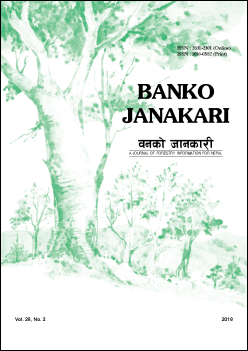Impact of anti-poaching approaches for the success of Rhino conservation in Chitwan National Park, Nepal
DOI:
https://doi.org/10.3126/banko.v28i2.24185Keywords:
Anti-poaching, one-horned rhino, patrol efforts, patrol frequency, SMART, patrollingAbstract
Nepal has succeeded in granting better protection for its Asian rhino population that has become exemplary in the world. Effective law enforcement along with community participation has been acclaimed as a reason for this achievement. However, there have been very few studies to assess the effectiveness of current anti-poaching strategies. In this study, we assessed the performance of SMART patrolling and population trend of rhino in Chitwan National Park (CNP). The patrol data collected through patrolling logbooks were used to visualize the coverage of SMART in the CNP and its Buffer Zone by dividing it into 1km*1km grid cell. Logistic regression models were used to analyze whether or not the patrol effort and patrol frequency correlate with the reduction in occurrences of illegal activities. A total of 6,593 patrols were conducted within the last fifteen months. Logistic regression models revealed that sites with a greater frequency of patrols, rather than the combined distance walked, had a lower probability of occurrence of illegal activities (βPatrol.frequency= -8.6428 & βPatrol.effort= -4.1804). This implies that patrol frequency was found more significant than patrol efforts in reducing prevalence of illegal activities in and around the CNP. The poaching activities were found high during insurgency period. The trend in rhino poaching was found to be decreased with increase in number of security posts, Community-based Anti-poaching Unit formation, conservation education and sweeping/camping operations. To maintain the continuous success in the long-run, it is crucial to regulate and enhance effective law enforcement capability and more advance techno-based modality in close coordination with stakeholders including community institutions.
Downloads
Downloads
Published
How to Cite
Issue
Section
License
© Forest Research and Training Centre, Ministry of Forests and Environment, Nepal




